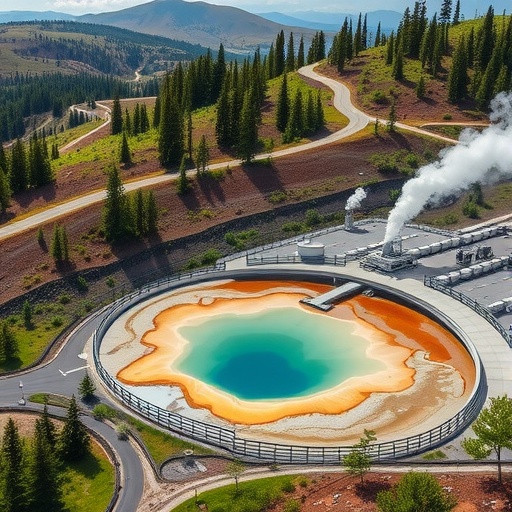In an era where climate change and energy sustainability pose significant global challenges, researchers from Zargartalebi’s team have made substantial strides in harnessing geothermal energy. Their recent study, published in Communications Earth and Environment, encapsulates groundbreaking research on closed-loop geothermal systems, which have emerged as a promising avenue for generating low-carbon renewable energy. This innovative approach to geothermal energy not only optimizes efficiency but also offers a compelling solution to the increasing demand for sustainable energy sources.
The authors delve into the mechanics of closed-loop geothermal systems, highlighting their operation through a series of pipes buried underground. These systems utilize the earth’s stable sub-surface temperatures to regulate indoor climates for residential and commercial buildings. Unlike conventional geothermal systems, which depend on the temperature of underground water reservoirs, closed-loop systems rely on a sealed network of pipes filled with a heat transfer fluid. This distinction allows for a more controlled and efficient extraction of geothermal energy, making it suitable for diverse geographical locations where traditional methods might falter.
What sets closed-loop systems apart is their minimal environmental impact and the capacity for energy independence. When implemented correctly, these systems integrate seamlessly with existing structures, requiring less invasive installation processes compared to traditional geothermal energy methods. By significantly reducing greenhouse gas emissions associated with heating and cooling, closed-loop geothermal systems align with global sustainability goals, offering a cleaner alternative to fossil fuels.
The research team conducted extensive field tests, which revealed that closed-loop geothermal systems can achieve high thermal efficiencies. Their data demonstrate that, despite various climatic conditions—from frigid winters to scorching summers—these systems maintain optimum performance, ensuring that buildings remain energy-efficient year-round. The study also emphasizes that these systems require less maintenance over time, thanks to their closed nature, resulting in reduced operational costs for homeowners and businesses alike.
A notable advantage of closed-loop geothermal systems is their versatility. They can be adapted to multiple settings, whether urban or rural, providing an inclusive energy solution that meets varying local demands. Additionally, their resilience in fluctuating temperatures positions them as ideal candidates for integration into modern smart grids. By coupling them with advanced energy management systems, the potential for optimizing energy consumption while minimizing waste becomes exceptionally viable.
Financial considerations are often barriers to implementing renewable energy solutions. However, Zargartalebi’s research illustrates that closed-loop geothermal systems can offer a favorable return on investment over time. With declining costs of installation and growing interest in sustainable energy practices, more investors are beginning to recognize geothermal energy as a lucrative avenue. The long-term savings on utility bills, combined with potential tax incentives, present a compelling case for transitioning to geothermal systems.
Furthermore, these systems contribute positively to energy resilience by diversifying energy portfolios. In a landscape dominated by unpredictable energy markets, a shift towards geothermal can provide stability and predictability in energy costs. This reliability is crucial for local economies and public infrastructure, particularly when faced with the constraints of climate-induced energy shortages.
The ecological footprint of closed-loop geothermal systems is considerably lower than traditional energy solutions. As concerns over climate change intensify, the call for reducing carbon emissions has never been more critical. Zargartalebi and his co-authors highlight that these systems not only lower emissions during operation but also reduce the carbon footprint associated with the production and installation of geothermal infrastructure.
To promote wider adoption of closed-loop geothermal systems, education and outreach initiatives are essential. Stakeholders must be informed about the potential benefits, comparative efficiencies, and unique characteristics of these systems. By raising awareness, communities will be better equipped to make informed decisions regarding their energy futures, ultimately paving the way for more environmentally conscious energy consumption.
The research team has also called for further investigations into hybrid systems that incorporate closed-loop geothermal with other renewable energy sources, such as solar and wind. By synergizing these technologies, the overall efficiency of energy systems could be enhanced, paving the way for a more sustainable energy landscape that meets the growing demands of society.
In conclusion, the work by Zargartalebi and his team highlights a pivotal advancement in the realm of renewable energy solutions. With a strong commitment to reducing carbon emissions, their exploration of closed-loop geothermal systems demonstrates a vast potential for innovation. As societies endeavor to combat climate change, integrating such technologies will be critical for achieving sustainable energy goals. Shift towards geothermal energy not only stands to revolutionize the energy industry but also represents a crucial step in preserving our environment for future generations.
The implications of this research extend beyond mere theory; they map a pathway for actionable change in how energy is produced, consumed, and sustainable practices are integrated into everyday life. Continued investment in geothermal technology could lead to groundbreaking reductions in fossil fuel reliance and enable a more resilient energy economy worldwide.
The future of energy systems may very well rely on the successful implementation of closed-loop geothermal systems. As industries and communities begin to embrace this innovative solution, a new era of renewable energy is on the horizon, highlighting the importance of interdisciplinary collaboration in addressing climate challenges and fostering sustainable development.
Subject of Research: Closed-loop geothermal systems as a source of low-carbon renewable energy.
Article Title: Closed-loop geothermal system is a potential source of low-carbon renewable energy.
Article References:
Zargartalebi, M., Darzi, A., Kazemi, A. et al. Closed-loop geothermal system is a potential source of low-carbon renewable energy.
Commun Earth Environ 6, 812 (2025). https://doi.org/10.1038/s43247-025-02729-9
Image Credits: AI Generated
DOI: 10.1038/s43247-025-02729-9
Keywords: Geothermal energy, Closed-loop systems, Renewable energy, Low-carbon technology, Sustainable development.




